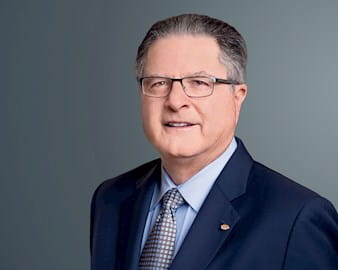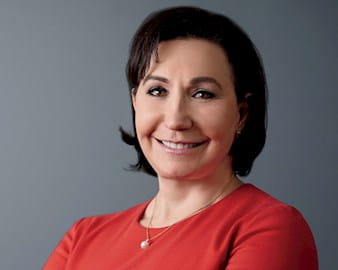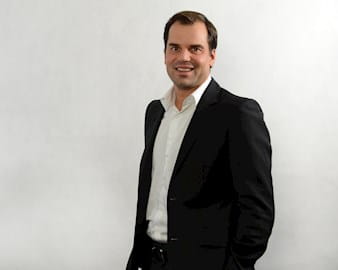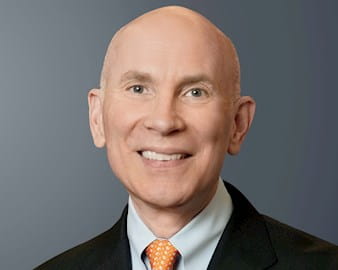
Chicago Booth honors four groundbreaking individuals who have shown visionary leadership and made a resounding impact in their careers.
- May 01, 2017
- Leadership

Since 1971, we have celebrated innovative leaders across all industries, from finance to the arts, manufacturing to public service, and beyond. The Distinguished Alumni Awards honor individuals who continue to challenge and change the world we live in, exemplifying the resounding impact of Chicago Booth. This year’s winners—three from the Booth class of 1980—have blazed singular paths to the leading edges of four very different industries: oil, pharmaceutical research, cable television, and food processing. Yet they all have proven their passion for digging deeper and discovering more at every stage of their illustrious careers.

John S. Watson
Chairman of the Board and CEO
Chevron Corporation
Immediately after earning his MBA at Booth, John S. Watson, ’80, joined Chevron as a financial analyst with a passion for the University of Chicago’s approach to economics. Rising to his current position as chairman of the board and CEO in 2010, Watson has embraced the American energy giant as a perfect fit over his long career.
“I was raised understanding that integrity and those personal characteristics that make up your reputation are very important,” Watson said. “It was wonderful to join Chevron and find those same characteristics. It’s been very much the compatibility of values, as expressed in the Chevron Way, that has kept me around for 37 years.”
Education remains a driving passion for Watson. “Chevron does a great deal around STEM—science, technology, engineering, and math,” Watson said. “As we look to hire young people, there’s an increasing shortfall, particularly among underrepresented minorities, in some of the technical disciplines. We support many programs to foster more opportunity and education for youth in those fields.”
“The way I dissect problems and take on issues—including the public position of our company in many areas—is based on some of the thinking skills that I developed at the University of Chicago.”
— John S. Watson

Amy Fershko Ellis
Cofounder and President
MedAvante, Inc.
Before colaunching clinical data services company MedAvante, Amy Fershko Ellis, ’80, excelled in a corporate environment, leading product development across a dizzying array of more than 20 consumer, business, and health-care categories, from chewing gum to perfume.
With MedAvante, the company she cofounded in 2002, Ellis helped pioneer a way to make clinical trials for mental health drugs faster and more conclusive, so that much-needed therapies could win approval and go to market. Facing a changing market, in 2014, Ellis led the launch of the Virgil® eSource Platform, a commercialization of MedAvante’s internal electronic investigative study platform.
The product pivot proved to be a game changer for MedAvante: two and a half years after launch, Virgil will deliver well over $100 million in sales in 2017. This spring, MedAvante was acquired for an extraordinary valuation in its category.
“At the end of the day it’s not about the dollars,” Ellis said. “Did you enjoy doing what you were doing? Did you help other people enjoy doing what they’re doing? Did you make a difference in their lives?”
“There is nothing like the freedom of being your own boss and in control of the decision making. I look around now, and my company is really making a difference.”
— Amy Fershko Ellis

Pedro de Andrade Faria
Global CEO
BRF S.A.
As global CEO of BRF, Pedro de Andrade Faria, ’02, helms one of the world’s largest food companies, with revenues of $10 billion in 2015 and more than 110,000 employees. Faria’s Booth education sharpened his ability to meet the diverse challenges of the demanding role.
“My experience at Booth gave me the confidence I needed to engage in all my career challenges, as well as all my life challenges,” Faria said. “That curiosity, that obsession with data, as well as that obsession with intellectual rigor, are an essential part of who I am today.”
Before joining BRF in 2013, Faria worked as a member of the board of directors and director of investor relations at Tarpon Investimentos S.A. He had previously served as executive partner at Patria Investments, responsible for monitoring the private equity portfolio. He has also worked at Chase Manhattan Bank and Banco Patrimonio/Salomon Brothers.
“I am blessed to have the opportunity to meet the brightest people from all over the world, young people full of aspiration, full of dreams,” Faria said. “I look for people in search not for a job, but for a purpose, a reason to be connected, a reason to belong to a cause. This to me is the most important element.”
“Previous to Booth, I had no experience outside of Brazil. I felt ambitious, and very curious. Spending time in Chicago, I had the opportunity to meet brilliant people from all over the world, and this really helped me gain a global perspective.”
— Pedro de Andrade Faria

Rob Kennedy
President and Co-CEO
C-SPAN
There’s a reason Rob Kennedy, ’80, has spent more than three decades at C-SPAN. He’s committed to the network’s mission to provide an unbiased take on the government’s affairs. “C-SPAN provides a fuller picture, and that’s important to have out there even in a time when, with our phones and feeds, our attention spans are getting shorter,” Kennedy said.
When he arrived at C-SPAN in the early 1980s, the nascent network offered Kennedy a unique opportunity to marry his analytical and financial talents honed at Booth with his passion for history, as well as the technical acumen he gained as an engineering major at the University of Illinois. “Booth took me from a somewhat narrowly focused engineer who was into circuits to a finance person to a corporate person who looked at things with the entire strategic vision in mind,” Kennedy said.
Kennedy has been C-SPAN’s top financial officer since 1987, and since 2012 has served as C-SPAN’s president and co-CEO, dedicated to the network’s core vision. “The mission is very simple and appeals to me naturally,” Kennedy said. “To bring Washington to the American people in as unmediated a way as possible.”
“As our industry changes, and people’s consumption of news and media changes, our challenge is to be there for people, so that C-SPAN continues to be this recognized brand of unfiltered information from Washington.”
— Rob Kennedy